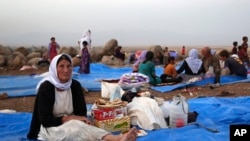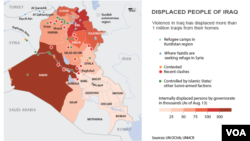Aid agencies are scaling up humanitarian operations in Iraq in response to the recent U.N. declaration that the displacement crisis in the country has reached its highest level of emergency.
An estimated 1.2 million people have fled their homes this year to escape attacks by the militant group known as the Islamic State.
The United Nations equates the crisis in Iraq with those unfolding in Syria, South Sudan and the Central African Republic. U.N. aid agencies are scrambling to help some 80,000 people from the minority Yazidi religious group and other religious minorities who fled to Syria earlier this month to escape Islamist rebels.
The Yazidis have subsequently crossed back into Iraq, entering the Dohuk governorate of Kurdistan.
U.N. refugee spokesman Dan McNorton calls the situation very fluid and rapidly evolving, saying the refugees are arriving dehydrated and exhausted after having been forced to walk a long time in searing heat.
He says that finding shelter for these people is critical.
“We are very much looking at that with partners now — providing tents to those areas. We are looking at stepping up that assistance, and currently are in an ongoing assessment into exactly what those needs are and how best to deliver that," said McNorton.
In addition to caring for the 80,000 Iraqi refugees in Dohuk, UNHCR and its partners also are assisting some 15,000 Yazidis who remain in Syria.
The World Health Organization also is scaling up its humanitarian operations.
WHO spokesman Tariq Jasarevic says the agency has sent two trucks to Dohuk with a two-month supply of medicines for 30,000 people.
He says the International Committee of the Red Cross is delivering another two-month supply of medicines from WHO — enough for 20,000 people — to Yazidis who are still stuck in the Sinjar mountain range.
“We are trying to scale up our operations because there are several crises in Iraq now with the Syrian refugees in Kurdistan and in Anbar province. WHO is trying also to set up hubs in different cities — Baghdad, Erbil, Dohuk, Kirkuk and Basra — that will be staffed, not only from the headquarters or from the regional office, but we are trying also to recruit national staff to help us in providing the response to this crisis," said Jasarevic.
Jasarevic says WHO is recruiting 15 nurses and deploying them to the Department of Health in Dohuk. They will provide services in 20 health centers and hospitals.
He says the agency also is deploying 20 mobile clinics in Dohuk, which can serve around 300 patients a day.









